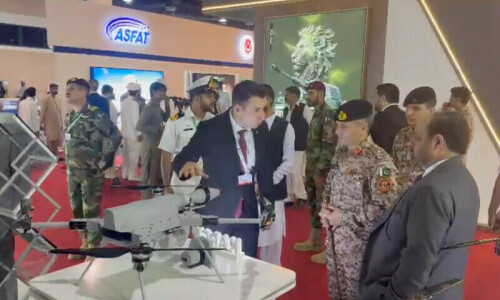
KARACHI: Despite Pakistan’s repeated assurances that its history as a nuclear scofflaw was firmly behind it, the US has continued to intensely monitor Pakistan’s nuclear and missile programmes, a survey of US diplomatic cables obtained by Dawn indicates.
Dozens of cables — some confidential, others secret — from US embassies around the world are seen inquiring into purchases by Pakistan’s nuclear and missile complexes on the international market.
For example, at the start of 2008, the US Deputy Chief of Mission Nancy McEldowney at the US embassy in Ankara details her discussions with Turkish authorities about the US desire to see action taken against a suspicious shipment to Pakistan.
US officials, according to the cable, “urged the GOT (Government of Turkey) to contact the governments of Japan and Panama to request the shipment be diverted to another port and returned to the shipper”.
While Turkish authorities “stressed that more lead time was necessary to allow the GOT to take action in such cases”, Ms McEldowney “underscored that, given the proliferation concerns related to this shipment and the fact that Pakistan’s nuclear program is not under full-scope IAEA safeguards, the GOT should take all necessary action to prevent the shipment from arriving in Pakistan”.
The intricate pursuit of suspect Pakistani shipments often involved discussions with Chinese authorities. For example, a secret cable from December 2009 notes that when local authorities were notified of “Beijing-based Nav Technology’s efforts to supply controlled gyroscopes to a firm in Pakistan”, US officials received a satisfactory response “that as with all proliferation cases China would ‘actively cooperate’ on this case”.
In Taiwan, too, Pakistan’s missile programme and related international trade came in for intense American scrutiny. In a secret cable sent out from Taipei in the autumn of 2005, the then director of the American Institute of Taiwan, Douglas H Paal, sent a detailed reported on Pakistan’s trade with a local manufacturer, Xtra Industrial Corporation.
Mr Paal writes about how “Pakistani manufacturer ‘Mechanical Engineering Workshop (MEW)’ possibly purchased 14 sets of ‘hydraulic cylinders’ from Xtra Industrial Corporation in March 2005, from Taiwan-based Design Engineering Centre (DEC) transferred to Pakistan’s National Development Complex (NDC) for research and development of short-mid range missiles.” As with other cases Taiwanese authorities were recommended that they place Xtra under an inspection target list even though the manufacturer did not violate Taiwan’s strategic high tech commodity export control regulations.
On one occasion, French authorities rebuffed US requests to intercept a “shipment of telemetry equipment from the French firm In’ Trad to Pakistan, with the possible end-user being New Technologies Islamabad, which is associated with Pakistan’s ballistic missile programme”.
In a secret cable from January 2005, a French non-proliferation official, David Bertolotti, is quoted as providing US officials with “comprehensive comments on the shipment and the reasons behind the Government of France’s decision not to examine its contents and to allow it to continue onto Pakistan”.
While the French officials emphasised that the “GOF wanted to be more helpful regarding the suspect corporation between In’Trad and Pakistani missile entities” they also pointed out that they needed “more precise information regarding the type of equipment being exported as well as clearer indications that the end users were associated with Pakistan’s ballistic missile programme”.
The fate of Abdul Qadeer Khan is also seen to be exercising the minds of American officials determined to ensure Mr Khan remains in detention.
In an April 2008 secret cable, then US Ambassador to Pakistan Anne Patterson stressed to the Strategic Plans Division chief Khalid Kidwai that talk of the “possible release of AQ Khan has caused alarm and concern” among US officials. The ambassador further emphasised the “USG was firmly opposed to lifting the current restrictions on Khan’s activities”.
In a separate meeting with Asif Zardari, then co-chairman of the PPP, Ambassador Patterson reminded him of Pakistan’s financial dependence on the United States and therefore the need to pay heed to matters of concern to the US government. “Not coincidentally, Ambassador raised the issue during a briefing on the extensive nature of US aid to Pakistan.”
Cables referenced: WikiLeaks # 238584, 137269, 41910, 25185, 150415. All cables are available on Dawn.com.












































